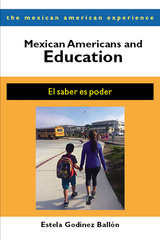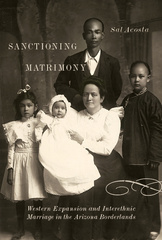Aztlán Arizona
Mexican American Educational Empowerment, 1968–1978
The University of Arizona Press
Aztlán Arizona is a history of the Chicano Movement in Arizona in the 1960s and 1970s. Focusing on community and student activism in Phoenix and Tucson, Darius V. Echeverría ties the Arizona events to the larger Chicano and civil rights movements against the backdrop of broad societal shifts that occurred throughout the country. Arizona’s unique role in the movement came from its (public) schools, which were the primary source of Chicano activism against the inequities in the judicial, social, economic, medical, political, and educational arenas.
The word Aztlán, originally meaning the legendary ancestral home of the Nahua peoples of Mesoamerica, was adopted as a symbol of independence by Chicano/a activists during the movement of the 1960s and 1970s. In an era when poverty, prejudice, and considerable oppositional forces blighted the lives of roughly one-fifth of Arizonans, the author argues that understanding those societal realities is essential to defining the rise and power of the Chicano Movement.
The book illustrates how Mexican American communities fostered a togetherness that ultimately modified larger Arizona society by revamping the educational history of the region. The concluding chapter outlines key Mexican American individuals and organizations that became politically active in order to address Chicano educational concerns. This Chicano unity, reflected in student, parent, and community leadership organizations, helped break barriers, dispel the Mexican American inferiority concept, and create educational change that benefited all Arizonans.
No other scholar has examined the emergence of Chicano Movement politics and its related school reform efforts in Arizona. Echeverría’s thorough research, rich in scope and interpretation, is coupled with detailed and exact endnotes. The book helps readers understand the issues surrounding the Chicano Movement educational reform and ethnic identity. Equally important, the author shows how residual effects of these dynamics are still pertinent today in places such as Tucson.
The word Aztlán, originally meaning the legendary ancestral home of the Nahua peoples of Mesoamerica, was adopted as a symbol of independence by Chicano/a activists during the movement of the 1960s and 1970s. In an era when poverty, prejudice, and considerable oppositional forces blighted the lives of roughly one-fifth of Arizonans, the author argues that understanding those societal realities is essential to defining the rise and power of the Chicano Movement.
The book illustrates how Mexican American communities fostered a togetherness that ultimately modified larger Arizona society by revamping the educational history of the region. The concluding chapter outlines key Mexican American individuals and organizations that became politically active in order to address Chicano educational concerns. This Chicano unity, reflected in student, parent, and community leadership organizations, helped break barriers, dispel the Mexican American inferiority concept, and create educational change that benefited all Arizonans.
No other scholar has examined the emergence of Chicano Movement politics and its related school reform efforts in Arizona. Echeverría’s thorough research, rich in scope and interpretation, is coupled with detailed and exact endnotes. The book helps readers understand the issues surrounding the Chicano Movement educational reform and ethnic identity. Equally important, the author shows how residual effects of these dynamics are still pertinent today in places such as Tucson.
Echeverría’s work is pathbreaking and unheralded in the historical literature of the Chicano/a student movement and in the Chicano Movement in particular.’—Christine Marin, archivist emeritus for the Chicano/a Research Collection, Arizona State University
‘Since Chicano(a) studies is interdisciplinary, books in the field can be used by folks in the social sciences and humanities, as well as Latino(a), ethnic, and American studies. I have little doubt that other disciplines will see a use for this book.’—Michael Soldatenko, author of Chicano Studies: The Genesis of a Discipline
Echeverría’s work is pathbreaking and unheralded in the historical literature of the Chicano/a student movement and in the Chicano Movement in particular.’—Christine Marin, archivist emeritus for the Chicano/a Research Collection, Arizona State University
‘Since Chicano(a) studies is interdisciplinary, books in the field can be used by folks in the social sciences and humanities, as well as Latino(a), ethnic, and American studies. I have little doubt that other disciplines will see a use for this book.’—Michael Soldatenko, author of Chicano Studies: The Genesis of a Discipline
The greatest strength of this timely, well-written book is linking the historic struggles for educational justice with the anti-immigrant and antiethnic studies politics that continue to permeate Arizona.’—Journal of American History
‘Beyond producing an original and timely study, Echeverría has also gestured toward fertile ground for future students and scholars in Latino studies.’—Latino Studies
‘Aztlán Arizona addresses an important gap in Mexican American/Chicano educational historiography.’—Southwest Historical Quarterly
‘Echeverría’s Aztlán Arizona is both timely and needed.’—History of Education Quarterly
‘Echeverría designed this book to fill a gap that exists in both the literature on Chicano movements in the United States and the literature on Arizona history, which prior to this volume mostly ignored the achievements of Arizonan-Mexican activists. He succeeds admirably in achieving this goal.’—Journal for Peace and Justice Studies
The greatest strength of this timely, well-written book is linking the historic struggles for educational justice with the anti-immigrant and antiethnic studies politics that continue to permeate Arizona.’—Journal of American History
‘Beyond producing an original and timely study, Echeverría has also gestured toward fertile ground for future students and scholars in Latino studies.’—Latino Studies
‘Aztlán Arizona addresses an important gap in Mexican American/Chicano educational historiography.’—Southwest Historical Quarterly
‘Echeverría’s Aztlán Arizona is both timely and needed.’—History of Education Quarterly
‘Echeverría designed this book to fill a gap that exists in both the literature on Chicano movements in the United States and the literature on Arizona history, which prior to this volume mostly ignored the achievements of Arizonan-Mexican activists. He succeeds admirably in achieving this goal.’—Journal for Peace and Justice Studies
Darius V. Echeverría is an advising dean at Columbia University, as well as a visiting assistant professor at Montclair State University and a visiting and affiliated faculty member in the Departments of History and Latino and Hispanic Caribbean Studies at Rutgers University. He earned his PhD in History from Temple University in 2006.
Introduction
1. Occupied Arizona: Mexican Americans and the Parameters of a Pedestrian People
2. A Measure of the Marginalized Mexican American: A Scholastic Survey of Spanish-Surnamed Strangers
3. Bias, Boycotts, and Battling Barriers: Mexican Americans in Public Schools
4. Activists of Academia: Students, Scholars, and Staffers at Arizona State University
5. The Promise and Peril of Protests: Undergraduates and Underrepresentation at the University of Arizona
6. A Part, Yet Apart: (Re)Arranging Academic Arizona from Hocus-Pocus to Horne
Notes
Bibliography
Index
















